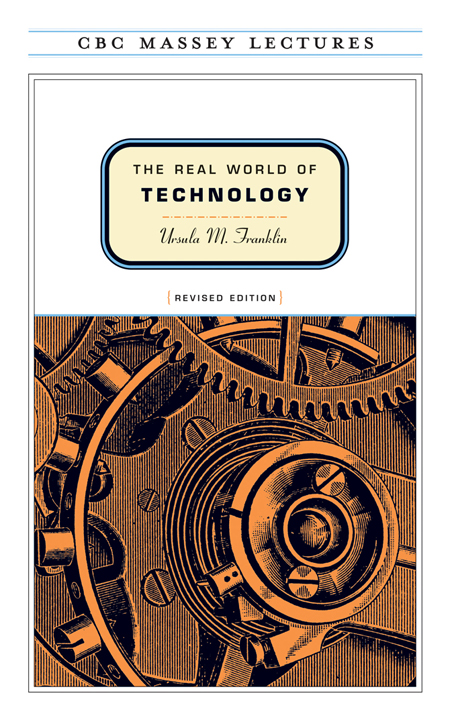Ursula Franklin: The Real World of Technology (1990–)
Filed under book | Tags: · labour, machine, society, technology, time

“In her 1989 CBC Massey Lectures, renowned scientist and humanitarian Ursula M. Franklin examines the social and political effects of technology. For her, technology is much more than machines, gadgets or electronic transmitters. It is a comprehensive system that includes methods, procedures, organization, “and most of all, a mindset”. She distinguishes between holistic technologies used by craft workers or artisans and prescriptive ones associated with a division of labour in large-scale production. Holistic technologies allow artisans to control their own work from start to finish. Prescriptive technologies organize work as a sequence of steps requiring supervision by bosses or managers. Franklin argues that the dominance of prescriptive technologies in modern society discourages critical thinking and promotes “a culture of compliance”.
The revised edition features four added chapters, in which Franklin tackles issues such as the dilution of privacy and intellectual property rights, the impact of the current technology on government and governance, the shift from consumer capitalism to investment capitalism, and the influence of the Internet upon the craft of writing.
Franklin acknowledges her intellectual debt to Jacques Ellul, Lewis Mumford, C.B. Macpherson, E. F. Schumacher and Vandana Shiva, among others.”
Publisher CBC Enterprises, Montréal, 1990
ISBN 0887943756
132 pages
Revised edition
Publisher House of Anansi Press, Toronto, 1999
ISBN 088784636X, 9780887846366
xii+209 pages
via seasounds, in the Unlimited Edition
Publisher (1999)
WorldCat (1999)
PDF (1990, 4 MB, added on 2021-2-27)
EPUB (rev.ed., 1999)
Audio recording
Julia Vaingurt: Wonderlands of the Avant-Garde: Technology and the Arts in Russia of the 1920s (2013)
Filed under book | Tags: · 1920s, aesthetics, architecture, art, art history, avant-garde, biomechanics, body, cinema, communism, constructivism, design, literature, machine, politics, russia, science fiction, sexuality, socialism, soviet union, technē, technology, theatre

“In postrevolutionary Russia, as the Soviet government was initiating a program of rapid industrialization, avant-garde artists declared their intent to serve the nascent state and to transform life in accordance with their aesthetic designs. In spite of their professed utilitarianism, however, most avant-gardists created works that can hardly be regarded as practical instruments of societal transformation. Exploring this paradox, Vaingurt claims that the artists’ investment of technology with aesthetics prevented their creations from being fully conscripted into the arsenal of political hegemony. The purposes of avant-garde technologies, she contends, are contemplative rather than constructive. Looking at Meyerhold’s theater, Tatlin’s and Khlebnikov’s architectural designs, Mayakovsky’s writings, and other works from the period, Vaingurt offers an innovative reading of an exceptionally complex moment in the formation of Soviet culture.”
Publisher Northwestern University Press, 2013
SRLT series
ISBN 0810128942, 9780810128941
322 pages
via Sorin
Review: Boris Dralyuk (NEP, 2013), Tim Harte (Slavic Review, 2014).
PDF (updated on 2022-11-12)
See also the science-fiction film Aelita, Queen of Mars, dir. Yakov Protazanov, 1924, 111 min, based on Tolstoy’s novel.
Comments (2)Stanislaus von Moos, Chris Smeenk (eds.): Avant Garde und Industrie (1983) [English/German]
Filed under book | Tags: · aesthetics, architecture, art history, avant-garde, city, futurism, industry, machine, technology

Collected papers from a symposium held at the Department of Architecture at Delft University of Technology in May 1981.
Contributions in English from Niels L. Prak, Leonard K. Eaton, Tim Benton, and Jan van Geest; in German from Franziska Bollerey, Hanne Bergius, Stanislaus von Moos, Andreas Haus, Flip Bool, Martin Steinmann, and Otakar Máčel.
Publisher Delft University Press, Delft, 1983
ISBN 9062751091
176 pages
via TU Delft
PDF (29 MB)
Comment (0)
